Difference between revisions of "Pig leather"
(→leather suitcase made of pig leather) |
|||
| Line 41: | Line 41: | ||
''Wild boar skin.''<br></p> | ''Wild boar skin.''<br></p> | ||
<p> </p> | <p> </p> | ||
| + | |||
| + | ==Peccary== | ||
| + | Peccary is the name for pig leather from the hides of wild [https://www.youtube.com/watch?v=LDmkdFwqTt8&list=PLdGEmp0I4Bawry89Il_c1uc1F7M0Tr7sx South American] nelfer pigs. The term "peccary" originates from the indigenous [https://www.youtube.com/watch?v=LDmkdFwqTt8&list=PLE1C68DCF3DA8680D Brazilian] Tupi language and roughly describes "an animal that treads many paths in the forest". Due to the free life in nature, the leather often has [[Natural markings on leather|scars and other defects]], which should be regarded as an authenticity feature. Peccary is used for valuable [[leather gloves|gloves]] due to its suppleness. It is also a popular source of food because of its aromatic meat. | ||
| + | |||
| + | |||
| + | <p align=center> | ||
| + | [[bild:peccary.jpg|500px]] | ||
| + | </p> | ||
| + | |||
| + | |||
| + | <p align=center> | ||
| + | [[bild:peccary3.jpg|250px]] | ||
| + | [[bild:peccary2.jpg|250px]] | ||
| + | </p> | ||
| + | |||
| + | <p align=center> | ||
| + | [[bild:Hanschuhe-Peccary-01.jpg|250px]] | ||
| + | [[bild:Hanschuhe-Peccary-02.jpg|250px]] | ||
| + | </p> | ||
| + | <p align=center> | ||
| + | ''Peccary pig. Soft [[leather gloves|glove leather]] of the peccary with visible [[Leather hair pores - Hair follicles|hair pores]] (available at [http://www.heinzbauer.com/index.php?clang=&nr= www.heinzbauer.com]).''<br></p> | ||
| + | <p> </p> | ||
| + | |||
| + | Peccary should not be confused with the similar [[carpincho leather]], which is of a [https://www.youtube.com/watch?v=LDmkdFwqTt8&list=PLdGEmp0I4Bawry89Il_c1uc1F7M0Tr7sx South American] large rodent type. | ||
| + | |||
==Pig [[leather clothing]]== | ==Pig [[leather clothing]]== | ||
| Line 82: | Line 107: | ||
<p> </p> | <p> </p> | ||
| − | == | + | ==[[Leather luggage|Leather suitcase]] made of pig leather== |
| − | + | In , suitcases made of pig leather are widespread. | |
<p align=center> | <p align=center> | ||
| − | [[bild: | + | [[bild:Lederoel_01_0601.jpg|245px]] |
| − | + | [[bild:Koffer-Schweinsleder-01.jpg|254px]] | |
| − | + | ||
| − | + | ||
| − | + | ||
| − | [[bild: | + | |
| − | + | ||
| − | + | ||
| − | + | ||
| − | + | ||
| − | + | ||
| − | + | ||
</p> | </p> | ||
<p align=center> | <p align=center> | ||
| − | '' | + | ''Typical [[Leather luggage|leather suitcase]] from [https://www.youtube.com/watch?v=LDmkdFwqTt8&list=PLdGEmp0I4Bawry89Il_c1uc1F7M0Tr7sx South America] made of pig leather.''<br></p> |
<p> </p> | <p> </p> | ||
| − | + | ==Rarities from pigskin== | |
| − | + | Due to the lower [[leather quality|stability]] of pigskin, the fields of application are limited. But there are historical exceptions. | |
| − | + | ||
| − | + | ||
| − | [[leather | + | |
| Line 118: | Line 130: | ||
''Pig leather is not suitable as an [[leather furniture|upholstery]] leather.''<br></p> | ''Pig leather is not suitable as an [[leather furniture|upholstery]] leather.''<br></p> | ||
<p> </p> | <p> </p> | ||
| − | |||
| − | |||
| − | |||
| − | |||
| − | |||
<p align=center> | <p align=center> | ||
| − | [[bild: | + | [[bild:Sattel-Schweinsleder-01.jpg|500px]] |
| − | + | ||
</p> | </p> | ||
<p align=center> | <p align=center> | ||
| − | '' | + | ''Very curious: An old [[leather saddle#Bicycle saddle|bicycle saddle]] made of pig leather.''<br></p> |
<p> </p> | <p> </p> | ||
| − | |||
| − | |||
| − | |||
| − | |||
<p align=center> | <p align=center> | ||
| − | [[bild: | + | [[bild:Saebel-Lederscheide-Schweinsleder-02.jpg|250px]] |
| + | [[bild:Saebel-Lederscheide-Schweinsleder-01.jpg|250px]] | ||
</p> | </p> | ||
<p align=center> | <p align=center> | ||
| − | '' | + | ''Approximately 100 years old [[weapon leather|saber sheath]] made of pig leather (photo [https://www.mw-blankwaffen.de/ www.mw-blankwaffen.de]).''<br></p> |
<p> </p> | <p> </p> | ||
Revision as of 10:45, 10 December 2017
Contents
Pig leather - Pigskin - Pig suede - Pork- Pork suede
Globally, there are about 950 million pigs (as of 2005) and almost 100% are slaughtered annually. Pigs are slaughtered at the age of 6 to 10 months. Pig suede is ranked fourth, with about 5 to 7% of world production. Pig leather is ranked fourth in the world's total leather production, after cow, sheep and goat leather.
Chinese pork dish. - Greek-style pork.
The leather of domestic pigs, commonly called pork, is distinguished from the wild boar. Peccary leather is the most representative for the leather industry. The European domestic pig, especially, provides a leather which is very rich in fat. Domestic pigs are only slightly hairy. The grouped holes of the hair pores are a characteristic of pig leather. Usually the hair follicles are grouped in packs of 3. The fibre structure within the pigskin is very different. The leather is loose and spongy on the head, while on the flank it is sometimes horny.
Domestic pig.
Pig suede. - Well recognizable: the hair pores.
Wild boar skin.
Peccary
Peccary is the name for pig leather from the hides of wild South American nelfer pigs. The term "peccary" originates from the indigenous Brazilian Tupi language and roughly describes "an animal that treads many paths in the forest". Due to the free life in nature, the leather often has scars and other defects, which should be regarded as an authenticity feature. Peccary is used for valuable gloves due to its suppleness. It is also a popular source of food because of its aromatic meat.
Peccary pig. Soft glove leather of the peccary with visible hair pores (available at www.heinzbauer.com).
Peccary should not be confused with the similar carpincho leather, which is of a South American large rodent type.
Pig leather clothing
Pig leather is most commonly used in clothing. In addition to lambskin and goat suede, it is the most common type of leather in leather clothing. All three leather types are light and not too warm and therefore ideal for leisure wear. Cow leather is mainly used for motorcycle suits. It is significantly thicker and tear proof and, for safety reasons, the first choice. The leather of the peccary is used predominantly for high-quality gloves.
Pig leather is also processed heavily in the cheaper segment of the leather clothing market, mostly as suede, but occasionally also as pigmented smooth leather. Pig leather is cheaper than lamb leather. Pig leather is less tear-resistant compared to high-quality lamb and goat leather. Pig leather also has a more cardboard-like haptic.
Pig leather is often sold at low prices.
Finished (pigmented) pig leather can still be recognised by the prominent pores.
Book covers and handbags inner lining
In addition to clothing leather, pig leather is also used as an inner lining for handbags or for book bindings.
Book cover made of pig leather from the collection of www.feinleder-hoffmann.com. - Pig leather as inner lining of a handbag.
Leather suitcase made of pig leather
In , suitcases made of pig leather are widespread.
Typical leather suitcase from South America made of pig leather.
Rarities from pigskin
Due to the lower stability of pigskin, the fields of application are limited. But there are historical exceptions.
Pig leather is not suitable as an upholstery leather.
Very curious: An old bicycle saddle made of pig leather.
Approximately 100 years old saber sheath made of pig leather (photo www.mw-blankwaffen.de).
Video about leather of different animal species
Leather of different animal species - Exotic leather.
Additional information







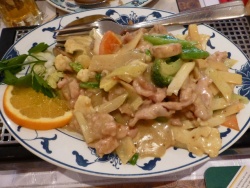
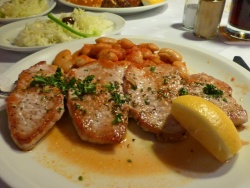

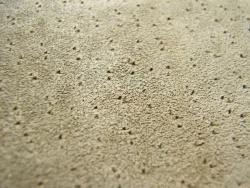
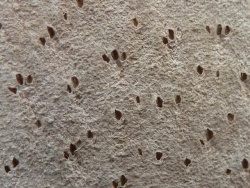
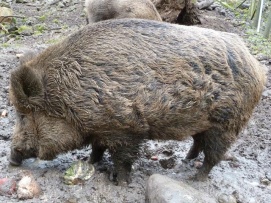
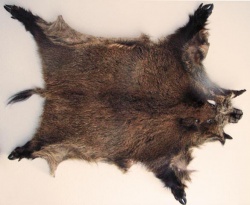

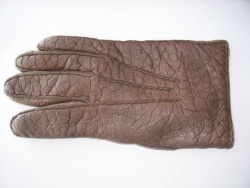

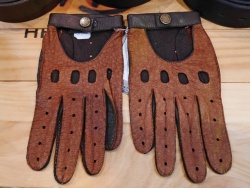
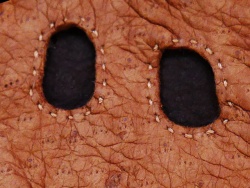


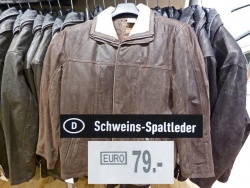
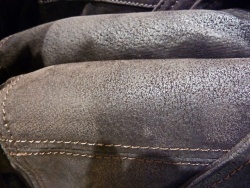
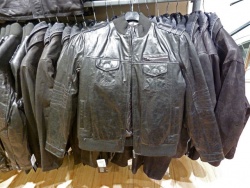
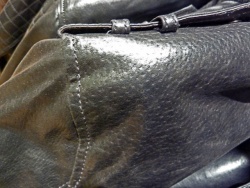

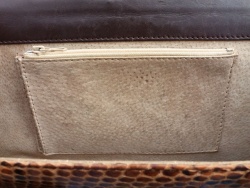
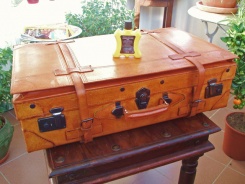
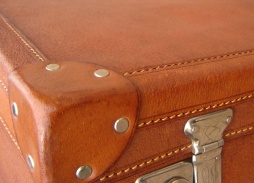
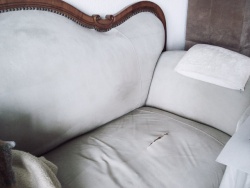
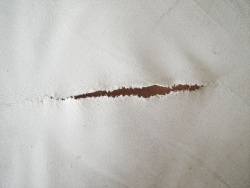
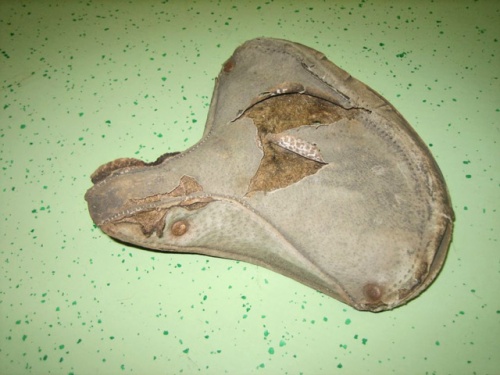

 a kotori web solution
a kotori web solution